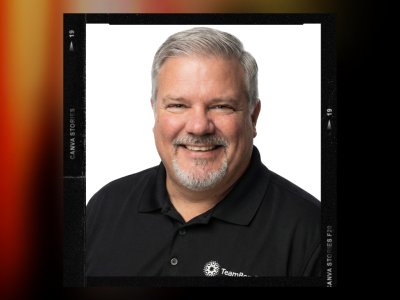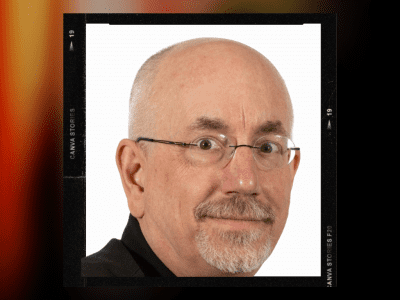STRONG TEAMS DON’T HAPPEN BY CHANCE 
Public Speaking Anxiety is Killing My Career
w/ Kit Pang

Use the buttons above to listen now.
Transcript - Public Speaking Anxiety is Killing My Career
Rich, Host: On this episode of Team Building Saves the World.
Kit Pang, BostonSpeaks: One person’s manager style, they’re off the cuff. Another person, they like more detail. If they didn’t have enough time to prepare, oh my god, how can I say this? I didn’t have enough time. Practicing more, learning more speaking skills, and having techniques to calm yourselves down is the slowest and most ineffective way to overcome public speaking anxiety.
Rich, Host: Really?
Kit Pang, BostonSpeaks: What do you think, Rich?
Rich, Host: Uh, couldn’t tell you. Uh, that’s why I’m asking you.
Hello team, it’s me, your old friend Rich Rininsland, host of Team Building Saves the World. The show where I speak to thought leaders from around the world, discussing variable strategies and tools to help you and your team build a better work environment. And today, we’re talking about Overcoming Public Speaking Anxiety with the founder of BostonSpeaks, Kit Pang.
But first, I have to share some love with my supporters at Team Bonding. If your team is ready to experience teamwork through the power of play, visit TeamBonding.com to learn more. Now, team, join me in welcoming my guest, a Harvard Business School public speaking coach and three times TEDx Speaker Coach, Kit Pang.
Hello, Kit!
Thank you.
Alrighty, my friend. So again, thank you so much for coming on. I’m glad to have you here. Let’s start out like I normally do. Can you just introduce yourself to my team out there. Tell them a little bit about, uh, how you got started, where you came from and what BostonSpeaks is all about.
Kit Pang, BostonSpeaks: Yeah. So, so to give you the quick, actually, no, let me go a little bit medium size here.
I actually used to be a hip hop street performer out here in Boston, Massachusetts. Yeah. Doing all of that. But my passion in dance started dying down and I did this public speaking competition in college and I fell in love with it. And I want everyone to kind of feel that same experience of being in the zone speaking.
So when my passion in dance started dying down, I started going to the libraries, coworking spaces, asking for free space to use. And then I would. Host a public speaking workshop, put them on up on Eventbrite and Meetup, and then we got butts in seats. And so we did a bunch of that. And then that’s how BostonSpeaks grew.
You know, our mission is to help individuals become more confident and influential speakers. So that’s the medium sized story of how everything got started.
Rich, Host: So the biggest problem that we are wanting to talk about today is the anxiety of public speaking. And I’m going to be honest with you. I have been a professional performer, I’ve been an actor since I was 25 professionally and of course starting in high school. I’ve never had a problem with public speaking. So when I hear that there’s an anxiety for it, I, I’m so curious to find out more. So what is public speaking anxiety?
Kit Pang, BostonSpeaks: And that’s a great question. And because, you know, we’re your listeners.
We’re talking about team building as well. So I want to talk about this a little bit. What is public speaking anxiety? So when I use the term public speaking anxiety, I do mean, yes, talking to when you’re standing up, talking to like 50 people, a bunch of people. Yes. However, we’re also talking about the definition of you’re on zoom meetings.It could be five to 10 people, 30 people on zoom meetings, or you could be at work settings. Uh, you’re sitting down or you’re standing up, you’re presenting to your weekly group. It could be 10 people there, or it could be, again, on a sit down for some people. It’s also maybe one on one during an interview.
So many people think that when we use the term public speaking anxiety, it means that we’re just shaking, And shaking very nervous when we have to speak. No, I don’t mean that. It means all of these situations where we hesitate to speak up and we’re not our most confident selves in the workplace. I’ll say that.
I’m leaving it to the workplace. Yeah,
Rich, Host: And that’s great. How is this relating to communication anxiety? Because communication, because I had thought communication anxiety was that. The, I can’t even look at you and sit down and talk to you without feeling a little bit trepidatious.
Kit Pang, BostonSpeaks: Yeah. So to answer that, whether it was communication or public speaking anxiety, the most important part is what is making us not feel like our most authentic and confident selves in our speaking situations.
When we’re speaking at work, well, yeah, even professionally, but at work,
Rich, Host: Is this something that occurs in the moment or can anxiety be as far back as just when you find out that you have the task at hand?
Kit Pang, BostonSpeaks: Oh yeah, sure. Sure. So, so Rich, I don’t know too much about you. Okay. But let me put some examples out there.
So let’s say Rich, you’re someone that seems very good when you go on the air or when you, you know, as, as you said, you’ve been speaking for a while, but then you might ask someone on your team, Oh, Hey. Uh, Lindsay, uh, uh, can you take over for one second? Because we think we’re so good. The other person’s like, what?
You just asked me? I can’t do that. It could be an impromptu setting in a meeting or presentation. It doesn’t matter what it is, right? So that’s why, uh, uh, interferes, uh, anywhere. A lot of people that we work with, it’s also the buildup time. They’re like, Oh, I have this event coming up. I have this important event coming up.
It could be the board meeting, a biweekly meeting, a team meeting. I have to be really good at this. So therefore they spend a lot of time over preparing and over analyzing before they even get into the thing.
Rich, Host: Right. Right.
Yeah. I wanted to say like, is this a very specific thing where it’s just like, when I consider anxiety, I can, you know, the palm sweats, the shaky knees, the. The rapid breathing, you know, things of that nature, but are there other methods that or other types of anxiety that come about is because of this?
Kit Pang, BostonSpeaks: Yeah. So, so let me give some examples. So when I’m using this meetings for now..
Rich, Host: Sure.
Kit Pang, BostonSpeaks: Even in meetings, when people ask questions, people could think, I don’t know the best way to answer this, or even when they’re speaking and people are making a, they’re not, even though they’re not making negative face, they see other people’s blank face or other faces and they think, am I expressing myself clearly?
Am I saying, and we get in our heads, right? Am I saying this in the best way? And so anxiety can come about there. It’s just not the arms, palms, sweating and butterflies in the stomach, right? It’s the perfectionism that we have on what we say. How we say, how we appear as professionals.
Rich, Host: Okay. So you don’t want to look like you’re fumbling.
Kit Pang, BostonSpeaks: Yeah. Yeah. And then when we notice we’re fumbling. We, we, we work ourselves up and we give ourselves more anxiety. It was like, Oh my God, now I’m fumbling.
Rich, Host: So it’s the snowball effect. It can, it can just be the one little hiccup is enough to get somebody started in this whole, um, counterproductive frame of mind.
Kit Pang, BostonSpeaks: Correct. Correct. Yes.
Rich, Host: How does this happen though? I mean, is this just, is it the individual themselves or is it something in, is it something societally or something within different companies or. How, where do, where does this come from? And I’m so sorry, because this sounds so arrogant of me. It really does. It sounds like here’s this guy who’s claimed he’s never had this happen. But I, I, I can’t wrap my head around it sometimes.
Kit Pang, BostonSpeaks: I know, that’s a great, that’s a great thought question. So, so Rich, just saying for yourself, you never felt like, when people say public speaking fear, public speaking anxiety, you would say, what are they talking about, this always felt good for you?
Rich, Host: Yeah, yeah, yeah, yeah. Exactly.
Kit Pang, BostonSpeaks: Exactly. So this is one of the biggest issues I’m going to say in our society, people, we compare ourselves to others, right? So there could be people that looks up and they listen to you. They’re like, Oh my God, Rich, that guy. I mean, he seems so personal.
He seems so conversational. How does he do it? He seems so confident every single time, but me, when I go up, I fumble like a mess, I trip over my words, I don’t know what to say. I don’t look like everyone else out there, but so it’s going back to your, your original question, uh, kind of like why though, number one, it is society because everyone knows how to put on a poker face of confidence in the working world.
Rich, Host: Gotcha.
Kit Pang, BostonSpeaks: Everyone wants to appear confident. Everyone wants to sound confident because what’s the norm. If we sound more confident, if we appear more confident, then maybe people will trust us more. So then people don’t want to basically the world has painted that it’s a weak side. To show being nervous, to show fumbling, to show not being clear and coherent, x, y, z.
So it’s a society norm that great speakers don’t appear nervous, great speakers don’t fumble, great speakers are articulate all of the time. Again, this is not just 50 people public speaking situations, I’m talking about every day.
Rich, Host: Right, so looking at this in a corporation setting wise, it’s not always going to be like you had said, it’s not going to be that you have a month to prepare a speech to deliver in front of a board of directors or, you know, a, a, a room full of your peers.
It can be just as simple as the Monday morning, you know, meetings where you’re being set up for how the week is going to work and then suddenly your manager goes, and now Kit, why don’t you come on up and tell us where you are and where you’re going to be going this week? That’s enough to set somebody off with this?
Kit Pang, BostonSpeaks: Yes, exactly. So, so even we’re talking about managers, right? It’s now to communication styles. One person’s manager style, they’re off the cuff. Another person, they’re like more detailed. If they didn’t have enough time to prepare, Oh my God, how can I say this? I didn’t have enough time. And, and now it’s like, now it comes back to the communication, right?
If they didn’t have enough time, how can they speak clearly? So therefore, if they speak off the cuff, it doesn’t seem like it’s the best thing ever.
Rich, Host: Okay, what can a company do, what can a manager do, to help his people get through this? Because hopefully by the time their manager, if they’ve been hired as a manager, that public speaking anxiety is not something that’s going to affect them.
Kit Pang, BostonSpeaks: Yes, yes, and so what a manager can do is start the conversation.
Rich, Host: Okay.
Kit Pang, BostonSpeaks: Simply by having a conversation around, Hey, the way that we are communicating, what can we do better for you? Sometimes do you feel the most comfortable or are there things that we are doing? That’s causing anxiety. I mean, just address it directly because most people don’t even ask.
So I just want to give an example. There was one company that we were working with. Okay. I’m going to give you both sides, the boss and the employees. So they have to do like a bi weekly meeting every single time and and the boss called me and said Kit we need to help our people be more confident when they have to present and here’s what he said I don’t get why they get so nervous I make it such a comfortable environment for them.
I don’t even know why they get nervous in the first place. I mean, I tell them they can share what’s on their mind. I’m very open. I make it so, so much of a comfortable space. That’s what he’s saying.
Rich, Host: Yeah yeah..
Kit Pang, BostonSpeaks: That’s what he said. And then, uh, I didn’t get to talk with the employees. I was just talking to him and I was, I was saying, you might think that have you ever asked your employees why they might be feeling that way instead of working on the speaking skills.
They don’t even have to work on the speaking skills, I’m like, have you had a conversation around why they might feel more nerves in these situations? So what I’m saying is, as a manager or leader, start the conversation.
Rich, Host: Did you get a chance to actually talk to the employees in this example? I don’t, I, don’t, please, you don’t have to say names or anything, but what was it that they said set, set their fear off?
Kit Pang, BostonSpeaks: Yeah, so in most cases it’s usually these, not even that place most cases. So what they noticed was it was just not the boss, there was another person in there. It was so high stakes for them. It felt high stakes for them because both of them saw these projects as the most important and they want to get, and their personality is like, we got to get this right.
We got to do that. Okay. So it might not come across like that from the, from the leader or the boss, but those are some things that they don’t know we’re contributing. To the, to the pressure that people were feeling.
Rich, Host: So what else can the manager do? Um, start the ball, you know, just start the communication, start the conversation. What else can they do even beforehand?
Kit Pang, BostonSpeaks: Yeah, this is very powerful. The managers also need to share the few times they got nervous speaking.
Rich, Host: Okay.
Kit Pang, BostonSpeaks: Okay. Let me, let me give another example. I’m taking this out of a work scenario. So I was talking to a client and his son was going to do a math test at school.
And the son was very nervous for the math test. Okay. And after talking, I woke up with my client and helping him realize, hey, it’s good, it’s okay to be, you know, nervous and everything. This is what he shared with his son before the math test. He said, he says, son, you know, when you get into the math test, it’s absolutely normal to be okay.
You know, your father, me, I get nervous when I have to speak. I get nervous when I have to go into an important event. And I kid you not, if you can see me right now, he’s, he, the client I work with, he said, his son opened up his eyes. It’s like, wow, my dad gets nervous and I can be nervous too. So what I’m saying as a manager, how can you share examples of yourself?
Maybe the last time you had perfectionism, the last time you felt imposter syndrome, the last time you got nervous speaking, you sharing will help your team share more too.
Rich, Host: What else can we discuss with the power dynamics, like within the company itself, within just the team itself? I mean, we’re hoping everybody feels comfortable with each other if they’re working with each other every day. But how can we as a team be that, give that level of support That we need to help maybe the one employee or the two employees who are suffering from this, from this anxiety.
Kit Pang, BostonSpeaks: Yeah. I would say, uh, you know, as a team, it really goes back to having more conversations about it. You know, again, most people just don’t have the, most people, when it comes to public speaking or communication training, unfortunately, some people have it once a year.
Some people have it.. never. So it’s just this thing that they talk about once a year, there’s training and communication and public speaking. You know, I get it. Everyone’s busy, but how can you make it a focus? You know, instead of a, yes, it can be a conversation, but okay, today we’re going to have this topic about this, right?
Give us your take on this. What’s what’s, what’s going on. And so just making, making a piece of importance will help.
Rich, Host: Is there something that a person can do for themselves individually like outside of work to prepare for these kind of things?
Kit Pang, BostonSpeaks: Yeah. So this is very important. Uh, and, and this will turn some heads. Uh, so when people come to us, uh, they say Kit, uh, so let’s say it’s not the manager.
Okay. Let’s, let’s say we think it’s ourselves kind of like what you’re saying, right? They come and they say, how can I help myself become a better speaker? What kind of skills or techniques or more practice opportunities? Can you give us, right? Okay. So again, this is going to turn some heads. If you want to get over your speaking anxiety and become more confident, practicing more, learning more speaking skills and having techniques to calm themselves down is the slowest and most ineffective way to overcome public speaking anxiety.
Rich, Host: Really?
Kit Pang, BostonSpeaks: Yes. It will actually keep them in the loop of having anxiety longer. And let me show you why.
Rich, Host: Okay.
Kit Pang, BostonSpeaks: So actually a question for you, Rich, how long do you think an emotion?
Rich, Host: Oh, um, Just, I would say maybe seconds to minutes?
Kit Pang, BostonSpeaks: Yeah. Okay. Seconds to minutes, right? So some people say that some people say decades.
So these are most of the, so, so there’s a, um, it’s a Harvard brain scientists out there. She’s also time magazines, 100 most influential people. Uh, name is Dr. Joe Taylor gave a great, great, uh, Ted Talk. Here’s what she says. Your emotions only last for 90 seconds. Any emotions. Okay. So, uh, what do I mean by that?
So let’s say we use nerves and anxiety in our bodies. Chemicals get released, right? Adrenaline and cortisol. We just named that emotions as human beings, but that gets released. It can take 90 seconds for the emotions or chemicals to dissipate. So as an example, if you watch a movie or Netflix show, you can be happy, sad, scared, happy, scared, you know, throughout the thing.
And the emotion doesn’t touch. So the question now is, Why does it seem like every single time we go back to our same situation for speaking or whatever it is We feel the anxiety or the same emotion over and over and over again
Rich, Host: Yeah.
Kit Pang, BostonSpeaks: So most people ask this question. They say how do I get rid of the speaking anxiety?
Well, the thing is our emotions only last for 90 seconds, right? And the question we have to ask is what caused the release of the anxiety? Of the chemicals in the first place. What caused the release of the adrenaline in the cortisol? What do you think, Rich?
Rich, Host: Um, I couldn’t tell you. That’s why I’m asking you.
Kit Pang, BostonSpeaks: And so, the answer is, it’s your thoughts. Okay. What you’re thinking, how you’re thinking, why you’re thinking that way releases the chemicals in your body in the first place. So, so Albert Einstein, of course he has many quotes. There’s one of my favorite quotes. He said, if you have, if he had one hour to save the world, he would spend 55 minutes on finding the right problem in five minutes, solving it.
So why, why did I say that practicing learning more speaking skills and techniques are the slowest way? That’s because. They never address how they think about their speaking situation in the first place. So that’s why if they only practice more, if they only learn more speaking skills, they go into sidetrack land. They never ever address how they’re looking or thinking or perceiving the situations in the first place.
Rich, Host: Kit, I want to delve deeper into this, but right away though, I need to step aside for 90 seconds on my own because I do need to tell my team out there about a company I am very proud to be a part of.
TeamBonding was founded over 20 years ago with one simple question. How can employees have a great time while fostering strong, authentic bonds between people who work together? No matter where your company is located, team bonding offers powerful, engaging, custom team building events designed to get the best out of your team anywhere in the world.
They’ve created a catalog of innovative events using the power of play as a learning tool and tapping into the correlation of work and play. So whether it’s scavenger hunts or jeopardy or so much more, the TeamBonding of activities, whether they’re live, virtual or hybrid, maximizes the impact of team building with an accent on fun.
So visit TeamBonding.com to schedule your event now. TeamBonding when you want seriously fun results. And we’re back talking to Kit Pang about public speaking anxiety.
Kit, what is sidetrack land?
Kit Pang, BostonSpeaks:So when we go into sidetrack land, right, the question we’re trying to solve is how does one overcome the speaking anxiety in meetings, work situations, or public speaking, right?
So when they go into sidetrack land, they don’t address how they think or what’s causing them to have speaking anxiety in the first place. They just practice. They just learn more skills, hoping one day that everything will click, but they don’t know why they do it. People would just say, just do it, but they don’t know why.
Rich, Host: I have a very similar situation with my daughter who, she’s a wonderful performer in her own right. Get this girl on a stage with sheet music or with an instrument or, you know, with a, with a cast around her and she soars. It is so much fun and wonderful to watch, but get her in one problematic situation and you will watch her spiral.
And it’s just, and it’s always unfortunately a downward spiral. So while it continues, the negativity also continues. So. As I’ve been trying to do with her for years. How do we get somebody out of the loop?
Kit Pang, BostonSpeaks: Yeah. Yeah. So, so again, based on what I was saying earlier, right. So if your daughter feels like they’ve been in a loop, how can you, which the father think of an experience, maybe you got into a loop one day, number one, it’s just to share an experience that everyone feels this way, because the worst thing is when people get into a loop, they feel like they’re the only ones getting in that loop, right?
Right. So if we can normalize the experience. Uh, it’s, it’s a, a bonding moment, I would say. Right? Uh, a second thing I would say, when everyone, when anyone gets into a loop, uh, when people have anxiety or fear, they get more narrow minded.
Rich, Host: Okay?
Kit Pang, BostonSpeaks: So the, the solution in that, when one becomes aware, number one is to become aware, oh, I just got narrow-minded. How can I ask myself the question? How can I think more broad right now? Okay, so let me give an example of this so one day. I was at Whole Foods, and I was using my American Express And the credit card declined.
Rich, Host: Oh, I’m not sure if you have a million times, as I say, I’ve been an actor most of my life, so yes, a million times. My credit card has been declined.
Kit Pang, BostonSpeaks: So that was the first time that happened to me.
Rich, Host: Oh, okay.
Kit Pang, BostonSpeaks: Yeah. It was the first time. I’m like, Oh my God, my American, like I tried it three or four or five times swiping it over and over. And I’m like, why is this not working? Does someone hack my credit card? I know there’s money in there.
Does someone hack my credit card?
Rich, Host: Right.
Kit Pang, BostonSpeaks: Uh, what do I got to do now? Do I have to call the credit card company or whatever it is?
Rich, Host: Right.
Kit Pang, BostonSpeaks: So in that moment, My mind went narrow, kind of like if a, if a burglar came into anyone’s house, our minds would do the same thing because it’s natural. And this is what people have to get.
It’s natural. Our mind will go narrow because it’s trying to protect us. You know, if a burglar, if a burglar came in, we would be thinking, Oh my God, what bat can I grab? So in that moment, when my credit card declined over and over, I was getting, getting narrow minded and more narrow minded and more narrow minded.
So again, this is kind of like the loop, right? More narrow, more narrow, more narrow. Yep. So in that moment, I asked myself, what would I tell my clients to do? And so the answer was, how can I think more broad right now? So to answer myself, here’s how I thought more broadly. I gave myself the answers of, well, maybe the whole American express cards or something’s going wrong.
Maybe Whole Foods was having a problem with the credit card machine. But here’s what I did. Once I thought about it, just for like one second, I went up to the, uh, this was like a self checking out thing. I went up to another cashier and I asked them, Hey, My credit card’s not working. Is there something wrong with the machine?
She said yes. Everyone with American Express was having problems.
Rich, Host: Wow.
Kit Pang, BostonSpeaks: Okay, so narrow to broad.
Rich, Host: Okay. Now, that’s great to say. How do we get the person who is standing in front of a group there?
Kit Pang, BostonSpeaks: Okay. Now this is going to be the craziest thing I think you’re going to hear from all of your podcast interviews, I will make that statement.
Rich, Host: I have been waiting for someone to say that for five years now. Go!
Kit Pang, BostonSpeaks: There are two, there are two books that I’ve read that completely changed the way and how I, and how I or we help people with public speaking anxiety. Okay. Let me tell you the two books. Uh, the first, this is not the first book, but this is where I got the first book from.
Have you heard of the book Atomic Habits? Anyway, it’s a popular book about habits. Okay. So in that book, in that book, there were two sentences that said there was this Bible out there that helped people stop smoking and it was called “Alan Carr’s Easy Way to Stop Smoking.” So I run on Google, I run on Amazon, YouTube, when people read this book, they stop smoking. People who’s read, who smoked for 50 years, 30 years.
So, am I saying this works for everyone? I’m not saying, there are bad reviews on Amazon. But people like Ellen DeGeneres, yeah, people like Ellen DeGeneres, Richard Branson, Ashton Kutcher, Sir Anthony Hopkins, they gave a testimonial on their shows, right? Saying they read the book, they stopped smoking. So I got this book, there are no exercises in this book.
There’s nothing they need to do. When they finish reading the book, they lose the desire to smoke. Okay. So, at that same time, this is the first book, okay?
Rich, Host: Yeah, yeah, yeah.
Kit Pang, BostonSpeaks: I’m not sure if that’s crazy enough, okay?
Rich, Host: Ha!
Kit Pang, BostonSpeaks: So at that same time, I’m like, man, what is this? Is there anything else like this in the real world?
Yes, there’s, there’s a second book now, not by the same person. This book is called “Dr. Sardno, Healing Back Pain. Howard Stern’s a big proponent of this guy. I’ll get this. There are no exercises in the book. There’s nothing you need to do. Once you finish reading the book, you will have no more back pain.
The people, the people that’s been reading this book. Okay, Rich. They, they, went to surgeries, they went to physical therapy, right? They’ve been, again, am I saying this works for everyone? No, I’m not saying this works, but if you look at the YouTube reviews, Google reviews, Reddit reviews, no one’s paying them to say, Oh my God, Dr. Sarno, you’re a saint, you healed my life, you saved me. Now they’re saying the same exact thing to the Alan Carr, Alan Carr, you’re a hero, bless you. Da da da da da. Okay? Now here’s the interesting thing. Before both of them became books, people went into a half day lecture. A lecture. Not interactive. A lecture. When they finish the lecture, they left free from smoking or back pain.
Now, why am I saying all this? It took me one year to ask myself this question. Can this be done for public speaking anxiety? Could it be possible that people go into a presentation? Without exercises, without talking, only listening to a presentation, and they walk free and break free from public speaking anxiety.
Rich, Host: Okay.
Kit Pang, BostonSpeaks: And, so that took me a year to be like, can this actually be done? And then, now it took me another year to have all the guinea pigs, you know, to try out a presentation. So I took me one year, to now put together a presentation when people came in to, to listen to this presentation. And I have to say, this was my major project back in 2023.
We have this presentation. When people walk in, they listen to the presentation. They have such a mindset shift. They walk out and completely, completely different. They’re free from public speaking anxiety. So why am I saying this? Because it all goes back to the radical mindset shift that they have. When they go to the next speaking situation, they break free from their thing.
So I’m not sure if that’s the craziest thing you ever heard. I still..
Rich, Host: Well, the craziest thing would be if you said it didn’t work, because then it’s like, well, you have a career based on this. That would be crazier, but are you saying it’s just mind over matter? That it’s literally just thinking of something differently?
Kit Pang, BostonSpeaks: They believe in it so much that their speaking anxiety is gone.
Rich, Host: How do we get them there? I mean, you said that there’s nothing for them to do.
Kit Pang, BostonSpeaks: There’s nothing for them to do and actually if they want to use more techniques to calm their nerves down, that actually makes it worse.
Rich, Host: Then what?
Kit Pang, BostonSpeaks: And I’m being, and I’m, again, I’m saying this, I’ve been at Harvard business school, public speaking coach. This is what we do for a living at BostonSpeaks. You know, I mean, it’s the most farfetched thing ever.
Rich, Host: So is this what you do? You just get people like to talk to you. Like I’m talking to you right now and basically run that seminar for them on zoom or
Kit Pang, BostonSpeaks: Yes, we can do one on one.So, so that, so if the presentation does not work at, then it becomes individualized beliefs that people have surrounding the speaking situations.
Rich, Host: Okay.
Kit Pang, BostonSpeaks: But the, the, the way. The way the presentation works, the same thing with the Alan Carr book,
Rich, Host: Right.
Kit Pang, BostonSpeaks: Because every smoker or every person that has anxiety, what do you think is the most common thing among all my clients?
They think exactly the same way, no matter if they are in Hong Kong, New York, Los Angeles. They think exactly the same. So we took the same thinking patterns everyone had.
Rich, Host: Okay.
Kit Pang, BostonSpeaks: And we took each single thinking pattern and help people understand how to reverse them.
Rich, Host: What’s the thinking pattern?
Kit Pang, BostonSpeaks: So I’m, I’m just gonna give one.
Rich, Host: Yeah.
Kit Pang, BostonSpeaks: So would you, would you agree with this being seen as nervous is bad or weak?
Rich, Host: Yes, I agree.
Kit Pang, BostonSpeaks: Okay. When you, when you, so these are beliefs that we have.
Rich, Host: Okay.
Kit Pang, BostonSpeaks: Right. That’s a belief. If we no longer have that belief, it loosens the grip on our speaking anxiety.
Rich, Host: All right, okay.
Kit Pang, BostonSpeaks: Here’s another belief, people will judge us negatively.
You might not have that, some people have, but people will judge us and they’re going to judge us negatively. Okay.
Rich, Host: I would agree with that statement as well, yes.
Kit Pang, BostonSpeaks: Yeah, so when, so how do I, how do we know people will be free from speaking anxiety? When they no longer see these beliefs in the same light or way, everything loosens up.
So, so, so, so, it’s basically how can we help people subtract these beliefs from their lives? We’re not adding new views, we’re helping them subtract their current views.
Rich, Host: Right.
Kit Pang, BostonSpeaks: So they no longer see it in the same way. When they no longer see it in the same way, everything changes. I know I’m getting very theoretical here.
Rich, Host: A little bit, but is it, is the success based on experience? Is it something that when they do it once they should then be able to do it easier the next time? I mean, is this something that people can practice for?
You know, because you always say..
Kit Pang, BostonSpeaks: let me, okay, let me, let me go back. I’m going to get out of theoryland a little bit.
Rich, Host: Okay. Okay. Okay.
Kit Pang, BostonSpeaks: I want, I want to talk about beliefs and, and, and, and, and things a little bit. So the question is how quick can someone change their minds?
Rich, Host: Right. Right.
Kit Pang, BostonSpeaks: So I was using an example the other day, I was speaking to a client and, and, and I asked them, you know, what’s the thing that where other people are stubborn and you want, and you try to change their minds.
Right. And she gave the example of her mom. Does not want to eat egg yolks because she thinks that egg yolks are bad for her because of the cholesterol. Now, on her, the daughter’s side, she’s saying, No, egg yolks are actually good for you, you can have them. So the question now is, How fast can the mother change her mind and want to eat egg yolks?
That depends on a person, right? But it can be fast. It can be fast if they’re open minded.
Rich, Host: Sure. Sure.
Kit Pang, BostonSpeaks: So that means when they change their mind, they see it a whole different way. So let me give another example. If, if you’ve ever gotten cut off, uh, a driver cut you off at the beginning, you might be that jerk that, that, that, that, that, but then maybe you found out as this nice grandmother with her grandchild at the back seat.
So when you have a real, when you have a real, a real new, quick realization, the whole emotion shifts.
Rich, Host: Okay.
Kit Pang, BostonSpeaks: Again, we’re talking about emotion shifts, which, which talks about mindset shifts when they, when they see the situation completely differently, they no longer have the anxiety. So, so I said people will judge us negatively, right?
So let’s say a person that goes into the world and they, whatever they do, whatever they say, they don’t think people are going to judge them negatively. Of course, they’re not going to feel that high of anxiety if they don’t view people are going to see them being judged at all. There’s no practice they need to do.
They just, they. They see, I know this is more theoretical, but…
Rich, Host: I understand exactly because, um, the only thing that I have that I can equate this to back when I was directing for an outdoor festival event that involves a lot of interactive theater, people walking up and talking to others. I had this guy who one of my fellow actors, um, one of the guys who was acting under me as his director, who was terrified of looking stupid.
But he was playing like the village idiot character, you know, and I’m trying to tell him how fun and freeing that kind of character can be to be able to do and say basically anything and to enjoy it is like very freeing. And it took him forever to even want to try because he didn’t want to look stupid and he was afraid that everybody was going to think that the character’s not dumb, but he is.
Kit Pang, BostonSpeaks: Yeah. Yeah. So Rich, that’s a great example because you, you have that perspective. Yeah. Right. Yeah. You saw because you had that perspective that why that’s why it was freeing. Imagine he had that same perspective, right? What would it do for him? Yeah. So that’s, that’s the question. How fast can someone open their minds to wanting to listen to other perspectives like yours, once they loosen the grip of their current perspective and they adopt like one of your perspectives.
The first side would lose his grip and the emotions would actually change. That’s how much practice did he need? Do you think?
Rich, Host: Well, I’ll be honest with you. He needed, um, to do it live in front of an audience. The first time he did it and people laughed not at him, but with him when he realized that it’s not that they’re pointing and laughing at him, they’re laughing with him because he’s having fun as much as they are.
Kit Pang, BostonSpeaks: Yes. One. So, so let’s go going back to practice, right? Yeah. They want to have that practice in order to see that, right, right. It’s not, it’s not. Yes. Of course there’s practice on the, on the skill side of it, but, but, but, but, but what I’m saying is, is the perception side, if they were to go to practice, they need to see that.
But, but in the speaking world is actually the opposite. Most people want to practice and be so good, they never show any flaws. So they get in the same loop over and over and over again.
Rich, Host: And it’s hard if something happens in the middle that they hadn’t foreseen.
Kit Pang, BostonSpeaks: Yeah. And they blame themselves and they say, Oh, I’m such a bad actor, a speaker, because I came out this way.
Rich, Host: Yeah. Yeah. Yeah. I mean, God remember that kind of person that anybody asked a question.
Kit Pang, BostonSpeaks: Yes. Yeah. Yeah, exactly. So I was going to ask you, which, um, you know, before our conversation today, when it comes to public speaking anxiety, Do you have a different definition of it now? Is it the same? I just wanted to get your take.
Rich, Host: I mean, my definition, you have clarified for me where people come from in this. I don’t know that I have an actual accurate definition of it. Uh, besides just that general mind lock. I mean, I do agree with you that, because this has even happened to me before, not in public speaking arrangements, but in those situations where, you know, If anything negative happens in my head, and it affects me emotionally, I keep fixating on that.
So you just keep bringing it up again, and again, and again, and again, until you manage to get yourself either outside of that experience, or to just say, stop, I now need to focus on this thing that I’m actually doing.
Kit Pang, BostonSpeaks: Yeah, yeah, exactly. And as human beings, we all go into those, you know, negative, negative, negative, depending on what it is. Yeah.Yeah.
Rich, Host: Well, Kit, um, I’m sure just listening to this episode, there are people out there who are thinking, I need to know more. I need to experience more. How can we learn more and how can people get in touch with you if they want to actually get your coaching going on?
Kit Pang, BostonSpeaks: Yeah, uh, thank you for asking, Rich.
I would say go to BostonSpeaks with an S dot com. All our information is on there. You can personally email me at kit at BostonSpeaks.com. And is that BostonSpeaks, capital B capital S or does it matter?
Kit Pang, BostonSpeaks: Well, the branding is capital B, capital S, but you guys can do whatever you want.
Rich, Host: Fantastic. My team, please give a huge round of applause for Kit Pang for being with us today. Kit, I hope you had a good time being here.
Kit Pang, BostonSpeaks: Yes. Thank you so much, Rich.
Rich, Host: Thank you. But don’t forget my friend, there’s still one more thing to do. It’s time for my speed round.
So just to explain to you how this works, I’m going to be playing some music for about 60 seconds. That just keeps me in track of time while we’re doing this. I’m going to ask you a series of completely innocuous questions. These are just questions to help us get to know you the man a little bit better than we did during this interview.
So if you’re ready, shall we begin? Alright, if you’re feeling at all competitive, you’re looking for 14 questions. As the number to beat. It’s a lot, but we’ll get through it. Alright, you all set?
Kit Pang, BostonSpeaks: Yes.
Rich, Host: When you hear the music playing, I’ll ask the first question, and away we go.
What’s your name?
Kit Pang, BostonSpeaks: Kit.
Rich, Host: Do you have any children?
Kit Pang, BostonSpeaks: No children.
Rich, Host: Do you have any pets?
Kit Pang, BostonSpeaks: Three cats. Three fighting cats.
Rich, Host: Nice. If you could hear your cats answer a question for you, what would that question be?
Kit Pang, BostonSpeaks: Give me food.
Rich, Host: What’s your favorite holiday?
Kit Pang, BostonSpeaks: Um, it doesn’t matter. None.
Rich, Host: What’s your favorite childhood memory?
Kit Pang, BostonSpeaks: It was when I got a scholarship to college. Um, I think I was, yes, that’s it. Okay.
Rich, Host: If you could, uh, be a cartoon character for a week, who would you wanna be?
Kit Pang, BostonSpeaks: Oh, oh, a cartoon character. Maybe SpongeBob. I don’t know why, but, okay.
Rich, Host: Something in your life that you really regret?
Kit Pang, BostonSpeaks: Something in my life that I really regret was not helping people. I had a little bit of public speaking anxiety earlier because I just helped them with practice.
Rich, Host: Nice. Uh, favorite memory from kindergarten?
Kit Pang, BostonSpeaks: Uh, people called me like the, the book bag guy because I used to carry a book bag around me all day long and wouldn’t let go of it.
Rich, Host: Would you feel like a leader or a follower?
Kit Pang, BostonSpeaks: I want to be both a leader and a follower.
Rich, Host: All right. We have hit 12, buddy. We had 12 today.
That was more, that was me as much as it was you. That was really, really good. All right. Um, Kit, once again, thank you so much for coming. I really appreciate you doing so. I would love to get into this more with you. So maybe we can have you back someday. Just see if this has grown any in your experience.
Kit Pang, BostonSpeaks: Yeah, that sounds great. Thank you again for having me.
Rich, Host: Thank you. And thank you, my team out there. That’s it! We’re wrapping up yet another episode of Team Building Saves The World. Please. If you are an old fan of the show or new to it, please feel free to share this information with anyone that you know, whether they’re a coworker, a friend, a family member, it just helps us to share all this vital information.
You can find out all about us, including all of our past episodes at teambonding. com slash podcast. You can also find us wherever you find your favorite podcasts, Google podcasts, Apple podcasts, Spotify. Wherever you go to listen, my friends, we will be there. And don’t forget to look for us on all the social medias at team bond podcast.
Leave us a message. Tell me what you liked about the show. What you didn’t like about the show. If you have an idea for a future episode, I want to hear from you. So before we say our final farewells for this episode of team building saves the world, please never forget my friends. If you are within the sound of my voice, you’re on my team now, and I am forever going to be on yours.
So long team. I’ll see you next time.
It’s been said that you learn more about a person in an hour of play than in a year of conversation, so why not put your coworkers to play with the help of the team at TeamBonding? TeamBonding was founded over 20 years ago with one simple question, how can employees have a great time while fostering strong authentic bonds between people who work together?
Their catalog of innovative events includes scavenger hunts, jeopardy, and much more. Each activity, whether live. Virtual or hybrid maximizes the impact of team building with an accent on fun. Visit TeamBonding.com to schedule your event. Now TeamBonding when you want seriously fun results.
April 26, 2024
Join Rich Rininsland and Kit Pang on “Team Building Saves the World” as they discuss public speaking anxiety. Explore radical mindset shifts and belief transformations for overcoming public speaking anxiety.
About Kit Pang:
Kit has been a guiding force for numerous leaders and high-achieving professionals, empowering them to communicate with enhanced confidence and influence. With a rich background as the founder of BostonSpeaks, a Harvard Business School Public Speaking Coach, and a three-time TEDx Speaker Coach, Kit has empowered countless leaders and high-performing professionals, including Fortune 500 CEOs, TEDx Speakers, NFL Players, Three-Star Michelin Chefs, rising stars, and executives like you. What sets Kit apart is his coaching and teaching style, which is not just informative but also fun and engaging. He’s committed to continuously evolving as a speaker and leader, always seeking new ways to inspire and captivate an audience.
In this phase of his journey in 2024, Kit is pouring his energy into two key facets: propelling BostonSpeaks to new heights of success and nurturing the growth of each team member.
If you want to get over your speaking anxiety and become more confident, practicing more, learning more speaking skills and having techniques to calm yourself down is the slowest and most ineffective way to overcome public speaking anxiety.
Kit Pang
More great podcast episodes.
Season 6 | Episode 18
That’s a Wrap!
Season 6 | Episode 17
Work-Life Integration
Season 6 | Episode 16
Laughing it Off
Season 6 | Episode 15
Corporate Volunteerism in Action
Season 6 | Episode 14
Collaborative Play at Work
Season 6 | Episode 13
The Science of Supportive Workplaces
Season 6 | Episode 12
The Power of Being Present
Season 6 | Episode 11
The Age Advantage




















